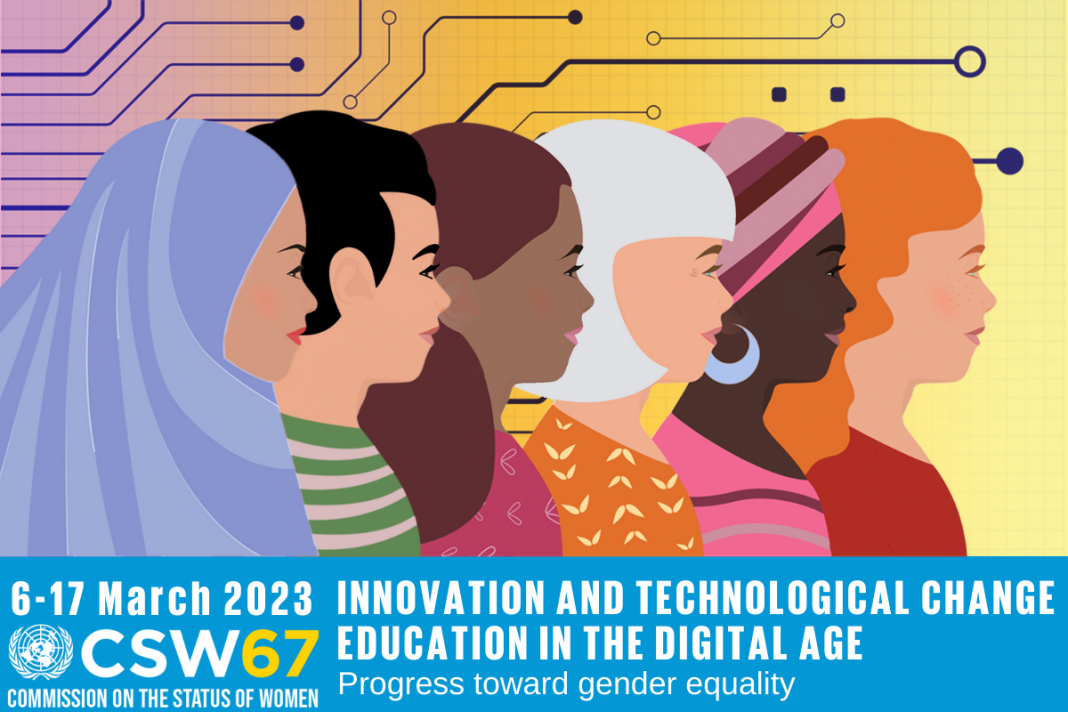The sixty-seventh session of the Commission on the Status of Women (CSW67) was held from March 6 to 17, 2023, under the theme “Innovation and technological change, and education in the digital age for achieving gender equality and the empowerment of all women and girls.”
This report provides an overview of the key themes and discussions that emerged during the session, including the role of technology in promoting gender equality and empowering women and girls, the importance of education in the digital age, and the need to address the digital gender divide.
The Commission on the Status of Women is the principal global intergovernmental body exclusively dedicated to the promotion of gender equality and the empowerment of women.
The sixty-seventh session of the Commission on the Status of Women (CSW67) was held from March 6 to 17, 2023, under the theme “Innovation and technological change, and education in the digital age for achieving gender equality and the empowerment of all women and girls.”
The session brought together representatives from member states, United Nations entities, and civil society organizations to discuss the challenges and opportunities associated with the use of technology to promote gender equality and empower women and girls in the digital age.
Also read: Gender Equality report by Rapporteur Khan
The discussions at CSW67 centered around three key themes: the role of technology in promoting gender equality and empowering women and girls, the importance of education in the digital age, and the need to address the digital gender divide.
The role of the technology session highlighted the potential of technology to promote gender equality and empower women and girls.
Technology can be used to enhance access to education and training, improve health outcomes, and increase economic opportunities.
Though, the discussions also highlighted the challenges associated with the use of technology, including the risk of perpetuating gender-based violence and discrimination, and the need to ensure that technology is accessible to all, including women and girls from marginalized communities.
Moreover, in the discussions at CSW67 emphasized the importance of education in the digital age for promoting gender equality and empowering women and girls.
Education can provide women and girls with the skills and knowledge they need to fully participate in the digital economy and take advantage of the opportunities offered by technology.
However, the deliberations also proposed the need to ensure that education is inclusive and accessible to all, including women and girls from marginalized communities.
Additionally, the digital gender divide refers to unequal access to technology and the internet between men and women.
The digital gender divide is a major barrier to gender equality and the empowerment of women and girls, as it limits their ability to fully participate in the digital economy and take advantage of the opportunities offered by technology.
Further, the commission indicated the need for policies and programs that promote gender equality in access to technology and the internet.
The sixty-seventh session of the Commission on the Status of Women (CSW67) highlighted the opportunities and challenges associated with the use of technology to promote gender equality and empower women and girls in the digital age.
In addition, the importance of education in the digital age and the need to address the digital gender divide. The session also highlighted the need for policies and programs that promote gender equality in access to technology and the internet.
Based on the discussions at CSW67, the following recommendations are made:
• Governments should prioritize policies and programs that promote gender equality in access to technology and the internet.
• Education systems should be reformed to ensure that they are inclusive. Also, accessible to all, including women and girls from marginalized communities.
• Civil society organizations should work to raise awareness of the opportunities and challenges associated with the use of technology to promote gender equality and empower women and girls.
• Private sector companies should adopt policies and practices.
Muhammad Dawood is a student of International Relations at University of Karachi, and can be reached at ydawood750@gmail.com. He is currently working as Foreign Affairs Correspondent in The Diplomatic Insight.








